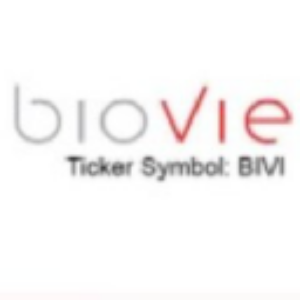BioVie’s Bezisterim Demonstrates Potential Improvements in Sleep/Fatigue and Restless Leg Symptoms for Parkinson’s Disease Patients
Rhea-AI Summary
BioVie announced promising results from a Phase 2a trial of their drug bezisterim for Parkinson's disease. Data presented at the XXIX World Congress on Parkinson's Disease and Related Disorders showed that patients treated with bezisterim in combination with levodopa/carbidopa experienced significant improvements in both motor and non-motor symptoms compared to placebo. Notably, bezisterim-treated patients saw a -2.8 point improvement on the motor section of the MDS-UPDRS scale. For patients under 70, the improvement was -4.7 points. Additionally, bezisterim-treated patients showed significant gains in sleep/fatigue and leg restlessness symptoms. These findings suggest bezisterim's potential as an adjunct therapy, warranting further investigation in late-phase trials.
Positive
- Bezisterim-treated patients experienced a -2.8 point improvement on the MDS-UPDRS motor scale.
- Patients under 70 showed an even greater improvement of -4.7 points on the MDS-UPDRS motor scale.
- 30% of bezisterim-treated patients improved in morning motor scores, whereas no placebo patients did.
- Bezisterim-treated patients saw a significant -2.4 point improvement in the sleep/fatigue domain of the NMSS scale.
- Patients treated with bezisterim experienced a -0.89 point improvement in leg restlessness.
- Improvements in sleep/fatigue correlated with improvements in motor scores (r=0.51, p=0.0259).
Negative
- The positive effects were statistically significant but the sample size and demographic details were not specified, which could impact generalizability.
- Placebo-treated patients experienced worsening symptoms in both the NMSS sleep/fatigue domain (+1.0 points) and leg restlessness (+0.99 points).
- The study results presented are from a Phase 2a trial, indicating that more extensive trials are needed before bezisterim can be considered for broader clinical use.
News Market Reaction – BIVI
On the day this news was published, BIVI gained 0.10%, reflecting a mild positive market reaction.
Data tracked by StockTitan Argus on the day of publication.
Full Dataset from Phase 2a trial in Parkinson’s Disease suggest patients treated with bezisterim experienced significant improvements in both non-motor symptoms and motor control while placebo-treated patients worsened
Improvements in non-motor symptoms correlated with improvements
in motor symptoms for Parkinson’s Disease patients
CARSON CITY, Nev., May 22, 2024 (GLOBE NEWSWIRE) -- BioVie Inc., (NASDAQ: BIVI) (“BioVie” or the “Company”) a clinical-stage company developing innovative drug therapies for the treatment of neurological and neurodegenerative disorders and advanced liver disease, today announced data from an oral presentation made yesterday at the XXIX World Congress on Parkinson’s Disease and Related Disorders hosted by the International Association of Parkinsonism and Related Disorders (IAPRD) and held May 19-22, 2024 in Lisbon, Portugal.
The presentation Improvement of Motor and Non-Motor Symptoms with Bezisterim Adjunctive to Carbidopa/Levodopa in Patients with Parkinson’s Disease: A Phase 2A, Placebo-Controlled Study was presented on May 21, 2024, and suggest improvements of bezisterim-treated patients with non-motor symptoms. These full dataset findings complement previously reported topline dataset findings of improvement in motor symptoms in patients treated with bezisterim and demonstrate potential intrinsic, levodopa-enhancing activity of bezisterim that is consistent with data from animal models.
Patients treated with bezisterim and levodopa/carbidopa experienced a -2.8 point advantage on the Patr III (Motor) score on the Motor Disease Society-Unified Parkinson’s Disease Rating Scale (MDS-UPDRS) compared to patients treated with placebo and levodopa/carbidopa. In patients younger than 70 years old (~
Bezisterim-treated patients experienced a significant improvement of -2.4 points for the sleep/fatigue domain of the Non-Motor Symptom Scale (NMSS) in Parkinson’s Disease, whereas placebo patients experienced a worsening of +1.0 points (p=0.0159). Sleep/fatigue domain improvements correlated with motor score improvements (r=0.51; p=0.0259). More patients on bezisterim had improvements in the NMSS sleep/fatigue domain, while more patients on placebo worsened.
Bezisterim-treated patients experienced an improvement of -0.89 on the urge to move legs/restlessness in legs whereas placebo patients experienced a worsening of +0.99 (p=0.0321).
“These full dataset findings suggest that bezisterim as adjunct therapy to levodopa may hold promise in ameliorating specific non-motor symptoms of Parkinson’s Disease, particularly in sleep/fatigue and restlessness of the legs,” stated Joseph Palumbo, BioVie’s Chief Medical Officer. “These findings extend previously reported improvement in motor symptoms with bezisterim and demonstrate potential intrinsic and levodopa-enhancing activity of bezisterim that is consistent with data from animal models and support further clinical investigation of bezisterim in late-phase trials.”
About Bezisterim
Bezisterim (NE3107) is an orally bioavailable, BBB-permeable, insulin-sensitizer that is also anti-inflammatory. In addition, it is not immunosuppressive and has a low risk of drug-to-drug interaction. Bezisterim has the potential to reduce symptoms of long COVID, including fatigue and cognitive dysfunction. Persistently circulating viral spike proteins are believed to trigger TLR-4 driven activation of NFkB and the subsequent expression of inflammatory cytokines (IL-6, TNF, IFNg). NE3107 has been shown to modulate the activation of NFkB and thus modulate inflammation.
Bezisterim is being investigated for Alzheimer’s disease (AD) and Parkinson’s disease (PD). BioVie has conducted and reported efficacy data on its Phase 3 randomized, double-blind, placebo-controlled, parallel-group, multicenter study to evaluate bezisterim in patients who have mild-to-moderate AD (NCT04669028). Results of a Phase 2 investigator-initiated trial (NCT05227820) showing bezisterim-treated patients experienced improved cognition and biomarker levels were presented at the Clinical Trials on Alzheimer’s Disease (CTAD) annual conference in December 2022. An estimated six million Americans suffer from AD. A Phase 2 study of bezisterim in PD (NCT05083260) has been completed, and data presented at the AD/PD™ 2023 International Conference on Alzheimer’s and Parkinson’s Diseases and related neurological disorders in Gothenburg, Sweden in March 2023 showed significant improvements in “morning on” symptoms and clinically meaningful improvement in motor control in patients treated with a combination of bezisterim and levodopa vs. patients treated with levodopa alone, and no drug-related adverse events.
About BioVie Inc.
BioVie Inc. (NASDAQ: BIVI) is a clinical-stage company developing innovative drug therapies for the treatment of neurological and neurodegenerative disorders and advanced liver disease. In neurodegenerative disease, the Company’s drug candidate bezisterim inhibits inflammatory activation of ERK and NFkB (e.g., TNF signaling) that leads to neuroinflammation and insulin resistance, but not their homeostatic functions (e.g., insulin signaling and neuron growth and survival). Both are drivers of AD and PD. In liver disease, the Company’s Orphan drug candidate BIV201 (continuous infusion terlipressin), with U.S. Food and Drug Administration (“FDA”) Fast Track status, is being evaluated and discussed with guidance received from the FDA regarding the design of Phase 3 clinical testing of BIV201 for the treatment of ascites due to chronic liver cirrhosis. The active agent is approved in the U.S. and in about 40 countries for related complications of advanced liver cirrhosis. For more information, visit www.bioviepharma.com.
Forward-Looking Statements
This press release contains forward-looking statements, which may be identified by words such as "expect," "look forward to," "anticipate" "intend," "plan," "believe," "seek," "estimate," "will," "project" or words of similar meaning. In this press release, forward-looking statements include, but are not limited to, the potential impact of bezisterim on cognition and function among study participants and topline data from the bezisterim trial. Although BioVie Inc. believes such forward-looking statements are based on reasonable assumptions, it can give no assurance that its expectations will be attained. Actual results may vary materially from those expressed or implied by the statements herein due to the Company's ability to successfully raise sufficient capital on reasonable terms or at all, available cash on hand and contractual and statutory limitations that could impair our ability to pay future dividends, our ability to complete our pre-clinical or clinical studies and to obtain approval for our product candidates, our ability to successfully defend potential future litigation, changes in local or national economic conditions as well as various additional risks, many of which are now unknown and generally out of the Company's control, and which are detailed from time to time in reports filed by the Company with the SEC, including quarterly reports on Form 10-Q, reports on Form 8-K and annual reports on Form 10-K. BioVie Inc. does not undertake any duty to update any statements contained herein (including any forward-looking statements), except as required by law.
For Investor Relations Inquiries:
Contact:
Bruce Mackle
Managing Director
LifeSci Advisors, LLC
bmackle@lifesciadvisors.com
For Media Inquires
Melyssa Weible
Managing Partner, Elixir Health Public Relations
Ph: +1 201-723-5705
mweible@elixirhealthpr.com








